
Surestar Technology's self-developed laser radar chip to create a global high-performance navig
source:Laserfair
release:Nick
keywords: LiDAR; autonomous driving
Time:2018-11-23
LiDAR is the most critical component of autonomous vehicles. As the autonomous vehicle industry enters mass production, the LiDAR market is about to enter mass production.
According to data from the French market research consultancy Yole Developpement, by 2032, the revenue of the LiDAR market will exceed 10 billion US dollars. American Velodyne, Quanergy, and IBEO in Germany have become top players in this field. Beijing Surestar Technology Co. Ltd., is also becoming a strong competitor in the global LiDAR industry with its 13 years of deep research in the mapping LiDAR market, as well as its own research and development of chips and numerous intellectual property rights.
Surestar Technology is the only company in the world that has both the measurement and navigation type of Lidar. In May 2016, it was the first to release a 16-line hybrid solid-state Lidar for autonomous vehicles in China. So far, it has developed two product lines, R-Fans and C-Fans, including 16- and 32-wire mechanical lidars, 64-line and 128-line hybrid solid-state Lidar products. These Lidars are now available for use on robots, unmanned logistics vehicles and autonomous vehicles.
In addition, Surestar Technology is developing an all-solid-state Lidar along the 3D Flash technology path, or it will become a competitor with companies such as Velodyne Germany IBEO. Surestar Technology is also developing a lighter and more expensive Lidar product to provide solutions for the development of the autonomous vehicles market in the next decade.
Quantitative work methodology
“My research fields can be connected.” Zhang Yushu, co-founder and CTO of North Branch, has studied computer, software engineering and Lidar in different periods. He learned experimental methodology from Western companies to create an internationally competitive Chinese cutting-edge technology product.
In 1996, Zhang Yushu, who graduated from Beijing University of Aeronautics and Astronautics, entered Tsinghua University as an assistant engineer at CIMS-ERC and worked on computer integrated manufacturing. Three years later, Zhang Yushu was awarded a full scholarship to the CAD major of the National University of Singapore. However, because the professional prospects did not meet his expectations, he turned to work in a US company's Asia-Pacific R&D center as a software engineer, focusing on the research of chip-pin gold wire high-precision bonding machines. During this period, he was sent to the United States for half a year to complete the project programming work.
In this company called Kulicle & Sofia, Zhang Yushu met a team leader who graduated from the University of Michigan. This Malay Chinese gave him great inspiration. "Things learned must be used, and some quantitative things are practiced." At the same time, Zhang Yushu learned the theory of embedded systems. "I look for data to combine theory with practice."
In 2000, Zhang Yushu combined his research expertise, work methodology and Lidar. At that time, he entered Optech Inc. as a senior engineer in Canada, researching and mapping Lidar, and doing embedded software programming development.
In 2005, Zhang Yushu, who has accumulated a profound industry background and professionalism, chose to return to China. He learned about China's emphasis on the Lidar industry and saw the status and market potential of the domestic industry. Therefore, he resolutely began to establish Surestar Technology, determined to be the Chinese Lidar brand. At that time, Zhang Yushu, 31, was enthusiastic and courageous. "At that time, I didn't think about what projects or subsidies I might get. I just wanted to be my Lidar. I think I can do better than the rest of the country."
Because of Zhang's work experience in the Lidar companies in Singapore and Canada, some domestic research institutes are very interested in him. In 2007, Zhang Yushu was specially invited as a visiting researcher by the Chinese Academy of Sciences, and soon made major breakthroughs in research and industry. The first study was initiated in April 2006 and in August, with results in five months. Zhang Yushu was also invited to participate in the research and development of some national projects.
In the following three years, Surestar Technology quickly gained a foothold in the mapping Lidar market and became an invisible hegemon.
Self-developed chips seize the opportunity
In the eyes of scientific research partners, Zhang Yushu is a steady leader, but he can always be unique.
In 2009, with the intensified competition in the Lidar market, Zhang Yushu decided to develop the self-developed Lidar IC (integrated circuit) with his keen technical sense of smell. “North Branch Sky Map is going to drive the market, or to do something to create on the tide.”
The chip is unfamiliar to other participants in the industry, but for Zhang Yushu, he has experience in chip research and development of circuit design, and he is good at using quantitative models. "In the industrial system, only the model of the electronics industry is the most complete. The capacitive components, the inductive devices, these digital devices, the mathematical model is very complete." “This means that the chip, or the development engineer for the board design, can rely heavily on tools to aid design support.”
Zhang Yushu has trained a chip research and development team for Surestar Technology, which makes Surestar Technology in the development of subsequent products, "the detection ability of weak signals is very strong, and the anti-interference ability to the environmental background is also very strong." Under the dual guarantee of “signal quality and mapping capability”, Surestar Technology’s product iteration capability and speed have also become the industry leader.
Since then, the North Branch has developed a strong support for the navigation obstacle avoidance Lidar. Zhang Yushu often tells the team that “Surestar Technology is a company with more than ten years of history. In the constant technical iteration, the pursuit is to lead.”
It is also because of the rapid development of core technology, Surestar Technology has developed two series of hybrid solid-state Lidar products, R and C, which cover multiple specifications such as 16-wire, 32-wire, 64-wire, and 128-line, and plans to introduce an all-solid-state Lidar based on the 3D Flash route.
Joined forces
In 2016, both Zhang Rushu and Surestar Technology have important significance. In May of this year, Surestar Technology released the first 16-line 360° scanning Lidar R-Fans-16 for autonomous vehicles. In the previous three years, Zhang Yushu has completed the technical reserve. However, based on the immature market conditions, the development of Surestar Technology smart car and intelligent robot navigation Lidar has only officially started in 2015.
"In the field of mapping and Lidar, we are convinced that we can seek a breakthrough, but it is not enough. Because the laser mapping radar market is very narrow after all, we are facing the impact of the IT industry, so we are passive to a certain extent." Zhang Yushu led the team to maintain a good growth rate and leading edge. His strategy is to "find talent" and "find his own path." With more efficient and high-quality resources, Surestar Technology has invested more manpower, material resources and financial resources into the autonomous vehicles industry, which is a bigger future market.
In the case of Zhang Yishu's self-developed chip and navigation Lidar, Ehsan Afshari, a high-frequency chip expert in the United States and a professor at the University of Michigan, came to China for the first time in 2015. He went to several university research institutes to give a speech and look at the changes that are taking place in China. At that time, he had trained a number of doctoral graduates, one of whom also became a professor of MIT. His patents also reached 10, and Qualcomm also purchased one of the patented technologies.
What Ehsan couldn’t have expected was that when he came to China again in 2018, he had become a partner with Chinese entrepreneurs. He conducted in-depth technical exchanges and cooperation prospects with Mr. Zhang Yushu at the office of Beijing Branch China.
In the eyes of Ehsan, Surestar Technology is an innovative company, and Zhang Yushu is a rigorous and reliable developer and manager. “They set goals and they started to move forward quickly. I like the initiative and focus on him.” “Management brings vitality to the company.”
Ehsan knew a year ago that Surestar Technology successfully developed its own Lidar chip, and produced a number of products that were welcomed by the market and quickly updated and iterated. “Impressive”, after being invited by Surestar Technology, Ehsan flew to Beijing for the first time and visited the laboratory and mass production factory of Surestar Technology. "Zhang Yushu's professional knowledge and technical expertise are very commendable." "He is a person who can be trusted." For Ehsan, his combined efforts with Zhang Yushu "can get good results." They also reached a consensus that only when the cost of new technology is minimized can it bring about a breakthrough contribution to the industry and truly achieve "theory-linked practice."
Ehsan became the chief scientist of the North Branch. He will work with Zhang Yushu and Surestar Technology to carry out the upgrade and research and development of IC to ensure that the high-performance Lidar of the Lidar chip technology level of Beijing Branch is always at the international leading level and the best balance between R&D technology and cost.
"We have had a lot of exciting cooperation results, we can see our market-oriented products within one to two years."
This is the result of accumulated efforts for both North Branch and Zhang Yushu. Zhang Yushu still likes to research his high-tech on the laboratory console. There, he saw the whole world.
- RoboSense is to Produce the First Chinese Multi-beam LiDAR
- China is to Accelerate the Development of Laser Hardening Application
- Han’s Laser Buys Canadian Fiber Specialist CorActive
- SPI Lasers continues it expansion in China, appointing a dedicated Sales Director
- Laser Coating Removal Robot for Aircraft
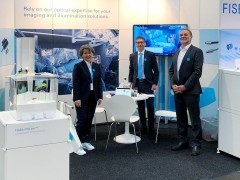 FISBA exhibits Customized Solutions for Minimally Invasive Medical Endoscopic Devices at COMPAMED in
FISBA exhibits Customized Solutions for Minimally Invasive Medical Endoscopic Devices at COMPAMED in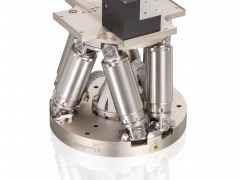 New Active Alignment System for the Coupling of Photonic Structures to Fiber Arrays
New Active Alignment System for the Coupling of Photonic Structures to Fiber Arrays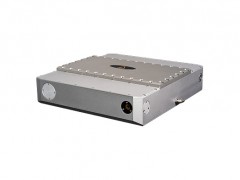 A new industrial compression module by Amplitude
A new industrial compression module by Amplitude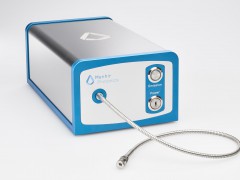 Menhir Photonics Introduces the MENHIR-1550 The Industry's First Turnkey Femtosecond Laser of
Menhir Photonics Introduces the MENHIR-1550 The Industry's First Turnkey Femtosecond Laser of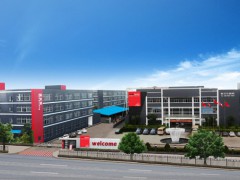 Shenzhen DNE Laser introduced new generation D-FAST cutting machine (12000 W)
more>>
Shenzhen DNE Laser introduced new generation D-FAST cutting machine (12000 W)
more>>
